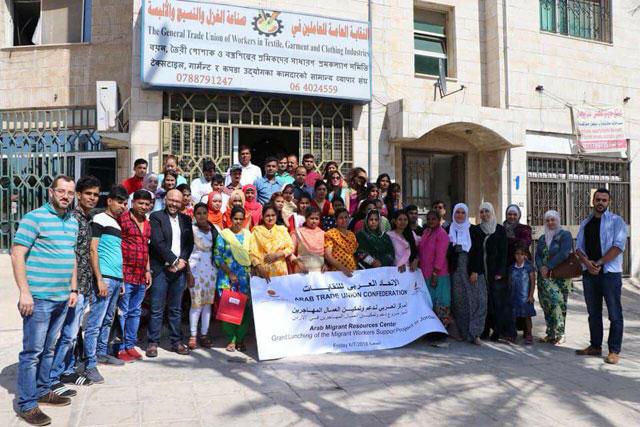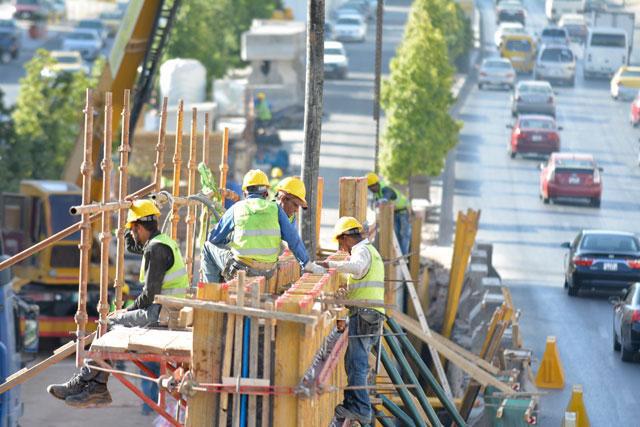You are here
Initiative launched to protect rights of migrant workers in Jordan
By Ana V. Ibáñez Prieto - Jul 09,2018 - Last updated at Jul 09,2018

Stakeholders pose for a group photo at the project launch ceremony at the General Trade Union of Workers in Textile, Garment and Clothing Industries, on Friday (Photo courtesy of General Federation of Jordanian Trade Unions)
AMMAN — The Arab Migrant Resources Centre (MRC) on Friday launched a project aimed at supporting and empowering a total of 230,000 migrant workers from Bangladesh, Nepal, Sri Lanka, Myanmar and Indonesia based in Jordan.
The initiative builds on a Memorandum of Understanding signed by the Arab Trade Union Confederation (ATUC) and the Association of Southeast Asian Nations TUC in 2015, where the organisations agreed to carry joint action to advance trade union solidarity and strengthen the cooperation among both parties for the protection of migrant workers coming from Asia to the Arab region.
Launched in a ceremony held at the General Trade Union of Workers in Textile, Garment and Clothing Industries, the project focuses on tackling the problems faced by migrant workers through the application of the International Labour Organisation (ILO) standards on items such as decent work conditions, working hours, healthcare, justice, equal pay and gender equality.
“The MRC has an important role to play in the empowerment and protection of migrant workers’ rights in Jordan,” ATUC Office Coordinator Hind Ben Ammar told The Jordan Times, highlighting the institution’s responsibility to provide information and assistance, capacity building and services for victims of exploitation and abuse.
Implemented with the support of the General Federation of Jordanian Trade Unions, the project also aims at guaranteeing the right of migrant workers to join trade unions in Jordan, focusing on the legislative constraints that migrant workers face when seeking representation.
“In most cases, migrant workers are not allowed to join trade unions, and even when they do, they are not granted the right to vote or to become a workers’ representative,” Ben Ammar warned, noting that “the ATUC is working with its affiliates across the region to let them open this space [trade unions] to give expatriate workers their right to express their situation and include them in the collective bargaining and social dialogue”.
“Migrant workers are the missing piece of the Arab trade union movement,” the activist continued, expressing her belief that “this movement can’t be complete if we continue ignoring this workers category”.
“We must bear in mind that the current model of trade unions in Jordan is not suitable for the improvement of the working conditions for all workers in the Kingdom whether they are Jordanian or migrants,” Jordan Labour Watch Director Ahmad Awad told The Jordan Times in a recent interview, pointing out that “some amendments must be made to the Labour Law in order to allow for the formation of trade unions based on the principles of freedom of association and the standards recognised in the International Covenant on Economic, Social and Cultural Rights and the ILO Convention No.87 on the Freedom of Association”.
Following the implementation of the project, the MRC will seek to expand the initiative to other members of the League of Arab States, according to a press release issued by the organisation.
“Jordan was chosen to establish the joint MRC because the country hosts migrant workers both from South and Southeast Asian countries and its environment was considered to be more open when compared to other countries in the Arab region, but this is not the final goal for us,” Ben Ammar explained, noting that the ATUC seeks to assist Arab workers migrating to other countries in the region and Europe in the future.
Related Articles
The lack of a comprehensive governance framework for migrant domestic workers in the region results in an asymmetric working relationship between them and their employers, according to an International Labour Organisation (ILO) study released on Sunday.
AMMAN — Regional Desk Officer for the Arab Region at the International Labour Organisation (ILO) Nezam Qahoush has recently stated that ther
AMMAN — The General Federation of Jordanian Trade Unions (GFJTU) held high-level discussions with the International Labour Organisation (ILO

















